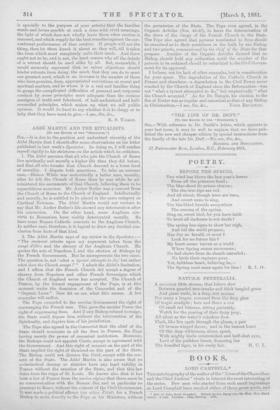ABBE' MARTIN AND THE RITUALISTS.
[To THE EDITOR or THE "SPECTATOR."]
SI11,—li is due to the position and undoubted sincerity of the Abbe Martin that I should offer some observations on his letter published in last week's Spectator. In doing so, I will confine myself rigidly to his strictures on the article which he criticises.
1. The Abbe assumes that all who join the Church of Rome live spiritually and morally a higher life than they did • before, and that all who forsake that Church descend to a lower level of morality. I dispute both assertions. To take an extreme case,—Blanco White was undoubtedly a better man, morally, after he left the Church of Rome than he was while he ad- ministered the sacraments of that Church, believing them to be superstitious nonsense. Mr. Archer Butler was a convert from the Church of Rome to the Church of England. Intellectually and morally, he is entitled to be placed. in the same category as Cardinal Newman. The Abbe Martin would not venture to say that Mr. Archer Butler's life showed any deterioration after his conversion. On the other hand, some Anglican con- verts to Romanism have visibly deteriorated morally. So have some Roman Catholic converts to the Anglican Church. In neither case, therefore, is it logical to draw any decided con- clusion from facts of that kind,
2, The Abbe Martin says of my review in the Spectator :— "The reviewer retorts upon my argument taken from the solve .d'aire and the slavery of the Anglican Church. He quotes the acts of Napoleon I. and the election of Bishops by the French Government. But he misrepresents the two cases. The question is, not 'what a tyrant attempts to do,' but rather what does the Church, accept ?'" I admit the Abbe'e limitation, and I affirm that the French Church did accept a degree of slavery from Napoleon and other French Sovereigns which the Church of England never has accepted. The Church of France, by the formal engagement of the Pope, is at this moment under the dominion of the Concordat and of the "Organic Laws." Now let us see what this means. A few examples will suffice.
The Pope conceded to the secular Government the right of rearranging the French sees. This gave the secular Power the right of suppressing Sees. And if any Bishop refused to resign, the State could depose him, without the intervention of the Spiritualty, and deprive him of his jurisdiction.
The Pope also agreed in the Concordat that the chief of the . State should nominate to ell the Sees in France, the Pope having merely the power of canonical institution. Moreover, the Bishops could not appoint Cures, except in agreement with
the Government. And this right of consent on the part of the State implied the right of dismissal on the part of the State. The Bishop could not dismiss the Cure, except with the con- sent of the State. The Abbe Martin is also aware that no ecclesiastical decrees or statutes have any legal validity in France without the sanction of the State, mind that this law • dates from the reign of St, Louis, He knows also that it has
bee a law of France from the ancien r(iginie that there must be no communication with the Roman See, and in particular no journey6 to Rome, without the consent of the Civil Government. It was made a political offence (Itil Cri/i10 (:raat) for a French Bishop to write directly to the Pope or his Ministers, without
the permission of the State. The Pope even agreed, in the Organic Articles (Nos. 42-4l), to leave the determination of the dress of the clergy of the French Church to the State. The Pope also agreed that persons nominated to Sees should be examined as to their souudnees in the faith by- one Bishop. and two priests, commissioned by the clilef of the State for that pnrpose. Another of the Organic Articles decreed that no Bishop should hold, any ordination until the number of the persons to be ordaiued should be submitted to the Civil Govern- ment for its approval.
I forbear, not for lack of other examples, but in consideration for your space. The degradation of the Catholic Church in France and. elsewhere—a degradation to the Civil Power never reached by the Church of England since the Reformation—was. not "what a tyrant attempted to do," but emphatically "what the Church accepted." As for Dr. Temple, his election to the See of Exeter was as regular and canonical as that of any Bishop
in Christendom.—!l am, Sir, &e., YOUR REVIEWER..


































 Previous page
Previous page